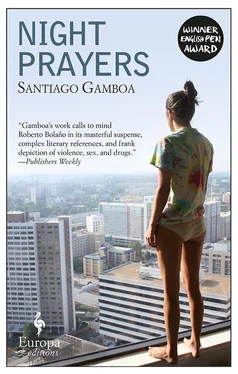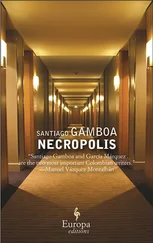Juana disappeared without anything to suggest it was about to happen, although later, remembering those afternoons at the university, it seemed to me that a wind of anguish was already blowing our way, the urgency of something that was about to fall, because sad and tragic things do announce their coming, I believe, they don’t come just like that, they aren’t mere chance, don’t you agree? At least that’s how I remember it now, how I imagine it, even though I always end up wondering, what could she have feared in those years? I knew very little of Juana’s life. Her constant absences, coming back early in the morning, bursting into tears for no obvious reason, all that was a mystery. That’s how we remember people who disappear or die, everything that happened before seems bathed in a symbolic glow, an aura that, with hindsight, appears to be the forewarning of a tragedy.
I’ve observed that there are two ways to die.
The first is an illness that causes us to deteriorate and submerges us in a slow agony. That’s sad, but in a way it’s good for the relatives and friends, who have time to get used to the idea, although it’s painful to the dying person himself, because of all the pain, decay, and indignity it carries with it. The second is the opposite: a gunshot in the back of the neck, a brain hemorrhage, a traffic accident. Your relatives suffer but you go quietly. You go quickly to the other side. That’s the best way.
But there’s a third way, at least in our country, a way that’s cruel for everybody: disappearance. For everybody? The victim suffers from imagining the anguish of his nearest and dearest. The relatives suffer because they cling to any hope they can, and when it’s lost they suffer even more when they imagine the terrible loneliness of the death: someone kneeling in a patch of waste ground, in the early morning, shaking with fear, pissing in his pants, then two or three flashes and, already, a lifeless body falling into a hole, the earth covering it, vegetation growing over it and hiding it, the long suffering of those who spend years investigating, searching for that place, that horrible, monstrous place, trying to understand the reasons, the still inexplicable reasons, for what happened, why he was killed, to find his bones and clasp them and kiss them, trying to relieve the loneliness, to bathe it with tears.
When Juana disappeared I felt all that: grief, hatred, sadness, pity, resentment, guilt.
There wasn’t even a date, at what moment did she go? We didn’t know, we didn’t even realize. She would go on her travels, giving vague details, and the family got used to it. I got used to it. Juana would ask me to understand, tell me that she was still working on our escape plan, that I shouldn’t ask questions, that I should trust her blindly. That’s why I didn’t know at what moment it happened.
One day I simply noticed she wasn’t there anymore.
And so began that succession of ideas, of intolerable images, of hurtful words. My first reaction was to grab my bag of spray cans and paint her on all the walls of the city: her eyes, the palm of her hand supporting her chin, her smiling face, her figure walking towards me, and a question, where are you? For me it was inconceivable that the world should continue to turn without her, that the sun should rise and shoots should emerge from the trunks of trees and there should be disasters in distant places, how could the wheel not stop? One day, on Thirtieth, I walked past one of my paintings and saw that someone, an anonymous graffiti artist, had written beside it: “Why don’t you come back? can’t you see how he’s suffering?” Somehow, the city was answering me.
She’s been murdered, I thought, she must be in one of those mass graves in this country that’s rich in cemeteries, our beautiful national territory, the body must be rotting, her bones must be starting to separate without anybody caressing them, without my having had the chance to kiss them.
Where are you, Juana?
I thought it would be enough to love her and walk about the city, reproducing her and calling to her on streets and avenues; I thought that intuition or a ray of sunlight, as in the poem by Salvatore Quasimodo, would indicate a place, but that didn’t happen. We reported her missing, and the small amount of information we were able to obtain showed that she hadn’t been arrested or murdered or kidnapped, of course the disappeared have no record of their disappearance, that’s why they call them disappeared, but you have to start somewhere, and Father, with that blind faith of his in the country that, according to him, “we had at last,” went to police stations, prisons, courthouses, hospitals, the ombudsman, and, finally, to his hated NGOs.
That’s when he started to change: his admiration for Uribe weakened and one day I heard him say that human rights weren’t being respected in Colombia, that our family had already lost the war, and that there had been enough raised fists and hot air. With bloodshot eyes and an expression that might well have been weariness, he said, we have to do things differently, we can’t carry on like this.
One Sunday, much to my surprise, he came and woke me early. Get dressed quickly and come with me, Manuel, your mother doesn’t want to come. I got up without knowing what it was about and had the shock of my life: Father was going to a demonstration for the disappeared! He was wearing a T-shirt that said Where are they? and holding a banner with a colored photograph of Juana. I had taken that photograph, Consul, and it was one of the best ones we had of her. On it she was smiling, just about to puff at a cigarette, looking out of the corner of her eye, as if keeping a humorous eye on someone, and raising a glass of wine. Father had chosen that photograph, and below it, in black letters, he had written Juana Manrique, twenty-four, disappeared November 2008 .
I got up and took a quick shower, put on a white T-shirt, on which I wrote my sister’s name, and went out with him, by his side for once, feeling that for the first time something united us. How strange this is, I thought, after a life spent not understanding each other, with me thinking him mediocre, always judging him harshly, but that morning, seeing him advancing along Seventh to Plaza de Bolívar, raising the banner with his daughter’s name and shouting, where is she? I admired him, for the first time in my life I wasn’t ashamed of him and I felt proud to be by his side, absorbing his cries so that his voice and mine should be one, and so I also raised my fist and cried out, feeling less alone, cried out for what we had lost that now made us both the same person.
Juana Manrique! where is she?
A mass of people was advancing, yelling slogans, holding up flags and banners with bloodstained silhouettes of the country, patterns of bones, mounds of corpses, crows with military hats, an enormous skeleton with a scythe in its hand and the presidential sash across its chest, saying, “Colombia, I will liberate you.” And the cry went up:
“Uribe, watch out, the people are coming!”
The demonstration reached Plaza de Bolívar, where the organizers had set up an enormous dais for the main event just in front of the steps of Congress. For a couple of hours there were orators citing testimonies and giving analyses, declarations of support from some senators and political personalities, songs, and even a mime show, the mimes weeping in silence, swallowing their sighs and their tears just as we were all doing in that square, a couple thousand sad, angry people, some still hopeful, until slowly it started to spit, the sky darkened, and the rain came down, in a neutral, subdued way at first, but then, after some terrifying claps of thunder, the downpour really began, forcing some of the people to run and take shelter in the colonnades of the cathedral or under the eaves on Eighth Street. Others took out umbrellas and remained in front of the stage, where the mimes were looking up at the clouds and making gestures of surprise. That’s how the rain is in Bogotá, it always arrives at the worst or saddest moments.
Читать дальше












